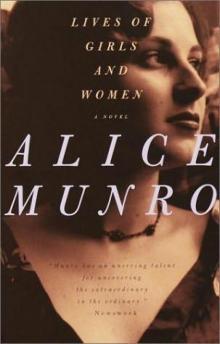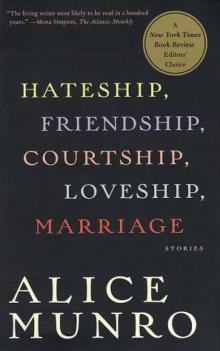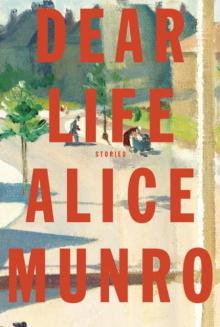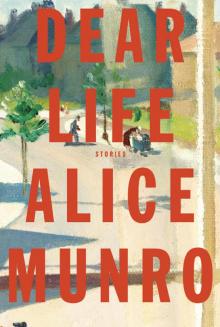- Home
- Alice Munro
Family Furnishings Page 15
Family Furnishings Read online
Page 15
“I just wanted you,” Jeffrey said. “I just wanted you in my bed.”
She said again, weakly, “No.”
Those words of his kept coming back to her. I wanted you in my bed. A half-joking urgency in his voice but also a determination, a practicality, as if “in my bed” meant something more, the bed he spoke of taking on larger, less material dimensions.
Had she made a great mistake with that refusal? With that reminder of how fenced in she was, in what anybody would call her real life?
—
THE BEACH WAS NEARLY EMPTY—people had got used to its being a rainy day. The sand was too heavy for Caitlin to make a castle or dig an irrigation system—projects she would only undertake with her father, anyway, because she sensed that his interest in them was wholehearted, and Pauline’s was not. She wandered a bit forlornly at the edge of the water. She probably missed the presence of other children, the nameless instant friends and occasional stone-throwing water-kicking enemies, the shrieking and splashing and falling about. A boy a little bigger than she was and apparently all by himself stood knee-deep in the water farther down the beach. If these two could get together it might be all right; the whole beach experience might be retrieved. Pauline couldn’t tell whether Caitlin was now making little splashy runs into the water for his benefit or whether he was watching her with interest or scorn.
Mara didn’t need company, at least for now. She stumbled towards the water, felt it touch her feet and changed her mind, stopped, looked around, and spotted Pauline. “Paw. Paw,” she said, in happy recognition. “Paw” was what she said for “Pauline,” instead of “Mother” or “Mommy.” Looking around overbalanced her—she sat down half on the sand and half in the water, made a squawk of surprise that turned to an announcement, then by some determined ungraceful maneuvers that involved putting her weight on her hands, she rose to her feet, wavering and triumphant. She had been walking for half a year, but getting around on the sand was still a challenge. Now she came back towards Pauline, making some reasonable, casual remarks in her own language.
“Sand,” said Pauline, holding up a clot of it. “Look. Mara. Sand.”
Mara corrected her, calling it something else—it sounded like “whap.” Her thick diaper under her plastic pants and her terry-cloth playsuit gave her a fat bottom, and that, along with her plump cheeks and shoulders and her sidelong important expression, made her look like a roguish matron.
Pauline became aware of someone calling her name. It had been called two or three times, but because the voice was unfamiliar she had not recognized it. She stood up and waved. It was the woman who worked in the store at the lodge. She was leaning over the balcony and calling, “Mrs. Keating. Mrs. Keating? Telephone, Mrs. Keating.”
Pauline hoisted Mara onto her hip and summoned Caitlin. She and the little boy were aware of each other now—they were both picking up stones from the bottom and flinging them out into the water. At first she didn’t hear Pauline, or pretended not to.
“Store,” called Pauline. “Caitlin. Store.” When she was sure Caitlin would follow—it was the word “store” that had done it, the reminder of the tiny store in the lodge where you could buy ice cream and candy and cigarettes and mixer—she began the trek across the sand and up the flight of wooden steps above the sand and the salal bushes. Halfway up she stopped, said, “Mara, you weigh a ton,” and shifted the baby to her other hip. Caitlin banged a stick against the railing.
“Can I have a Fudgsicle? Mother? Can I?”
“We’ll see.”
“Can I please have a Fudgsicle?”
“Wait.”
The public phone was beside a bulletin board on the other side of the main hall and across from the door to the dining room. A bingo game had been set up in there, because of the rain.
“Hope he’s still hanging on,” the woman who worked in the store called out. She was unseen now behind her counter.
Pauline, still holding Mara, picked up the dangling receiver and said breathlessly, “Hello?” She was expecting to hear Brian telling her about some delay in Campbell River or asking her what it was she had wanted him to get at the drugstore. It was just the one thing—calamine lotion—so he had not written it down.
“Pauline,” said Jeffrey. “It’s me.”
Mara was bumping and scrambling against Pauline’s side, anxious to get down. Caitlin came along the hall and went into the store, leaving wet sandy footprints. Pauline said, “Just a minute, just a minute.” She let Mara slide down and hurried to close the door that led to the steps. She did not remember telling Jeffrey the name of this place, though she had told him roughly where it was. She heard the woman in the store speaking to Caitlin in a sharper voice than she would use to children whose parents were beside them.
“Did you forget to put your feet under the tap?”
“I’m here,” said Jeffrey. “I didn’t get along well without you. I didn’t get along at all.”
Mara made for the dining room, as if the male voice calling out “Under the N—” was a direct invitation to her.
“Here. Where?” said Pauline.
She read the signs that were tacked up on the bulletin board beside the phone.
NO PERSON UNDER FOURTEEN YEARS OF AGE NOT ACCOMPANIED BY ADULT ALLOWED IN BOATS OR CANOES.
FISHING DERBY.
BAKE AND CRAFT SALE, ST. BARTHOLOMEW’S CHURCH.
YOUR LIFE IS IN YOUR HANDS. PALMS AND CARDS READ. REASONABLE AND ACCURATE. CALL CLAIRE.
“In a motel. In Campbell River.”
—
PAULINE KNEW WHERE SHE WAS before she opened her eyes. Nothing surprised her. She had slept but not deeply enough to let go of anything.
She had waited for Brian in the parking area of the lodge, with the children, and had asked him for the keys. She had told him in front of his parents that there was something else she needed, from Campbell River. He asked, What was it? And did she have any money?
“Just something,” she said, so he would think that it was tampons or birth control supplies, that she didn’t want to mention. “Sure.”
“Okay but you’ll have to put some gas in,” he said.
Later she had to speak to him on the phone. Jeffrey said she had to do it.
“Because he won’t take it from me. He’ll think I kidnapped you or something. He won’t believe it.”
But the strangest thing of all the things that day was that Brian did seem, immediately, to believe it. Standing where she had stood not so long before, in the public hallway of the lodge—the bingo game over now but people going past, she could hear them, people on their way out of the dining room after dinner—he said, “Oh. Oh. Oh. Okay” in a voice that would have to be quickly controlled, but that seemed to draw on a supply of fatalism or foreknowledge that went far beyond that necessity.
As if he had known all along, all along, what could happen with her.
“Okay,” he said. “What about the car?”
He said something else, something impossible, and hung up, and she came out of the phone booth beside some gas pumps in Campbell River.
“That was quick,” Jeffrey said. “Easier than you expected.”
Pauline said, “I don’t know.”
“He may have known it subconsciously. People do know.”
She shook her head, to tell him not to say any more, and he said, “Sorry.” They walked along the street not touching or talking.
—
THEY’D HAD TO GO OUT to find a phone booth because there was no phone in the motel room. Now in the early morning looking around at leisure—the first real leisure or freedom she’d had since she came into that room—Pauline saw that there wasn’t much of anything in it. Just a junk dresser, the bed without a headboard, an armless upholstered chair, on the window a venetian blind with a broken slat and curtain of orange plastic that was supposed to look like net and that didn’t have to be hemmed, just sliced off at the bottom. There was a noisy air conditioner—Jeffrey had turned it
off in the night and left the door open on the chain, since the window was sealed. The door was shut now. He must have got up in the night and shut it.
This was all she had. Her connection with the cottage where Brian lay asleep or not asleep was broken, also her connection with the house that had been an expression of her life with Brian, of the way they wanted to live. She had no furniture anymore. She had cut herself off from all the large solid acquisitions like the washer and dryer and the oak table and the refinished wardrobe and the chandelier that was a copy of the one in a painting by Vermeer. And just as much from those things that were particularly hers—the pressed-glass tumblers that she had been collecting and the prayer rug which was of course not authentic, but beautiful. Especially from those things. Even her books, she might have lost. Even her clothes. The skirt and blouse and sandals she had put on for the trip to Campbell River might well be all she had now to her name. She would never go back to lay claim to anything. If Brian got in touch with her to ask what was to be done with things, she would tell him to do what he liked—throw everything into garbage bags and take it to the dump, if that was what he liked. (In fact she knew that he would probably pack up a trunk, which he did, sending on, scrupulously, not only her winter coat and boots but things like the waist cincher she had worn at her wedding and never since, with the prayer rug draped over the top of everything like a final statement of his generosity, either natural or calculated.)
She believed that she would never again care about what sort of rooms she lived in or what sort of clothes she put on. She would not be looking for that sort of help to give anybody an idea of who she was, what she was like. Not even to give herself an idea. What she had done would be enough, it would be the whole thing.
What she was doing would be what she had heard about and read about. It was what Anna Karenina had done and what Madame Bovary had wanted to do. It was what a teacher at Brian’s school had done, with the school secretary. He had run off with her. That was what it was called. Running off with. Taking off with. It was spoken of disparagingly, humorously, enviously. It was adultery taken one step further. The people who did it had almost certainly been having an affair already, committing adultery for quite some time before they became desperate or courageous enough to take this step. Once in a long while a couple might claim their love was unconsummated and technically pure, but these people would be thought of—if anybody believed them—as being not only very serious and high-minded but almost devastatingly foolhardy, almost in a class with those who took a chance and gave up everything to go and work in some poor and dangerous country.
The others, the adulterers, were seen as irresponsible, immature, selfish, or even cruel. Also lucky. They were lucky because the sex they had been having in parked cars or the long grass or in each other’s sullied marriage beds or most likely in motels like this one must surely have been splendid. Otherwise they would never have got such a yearning for each other’s company at all costs or such a faith that their shared future would be altogether better and different in kind from what they had in the past.
Different in kind. That was what Pauline must believe now—that there was this major difference in lives or in marriages or unions between people. That some of them had a necessity, a fatefulness, about them that others did not have. Of course she would have said the same thing a year ago. People did say that, they seemed to believe that, and to believe that their own cases were all of the first, the special kind, even when anybody could see that they were not and that these people did not know what they were talking about. Pauline would not have known what she was talking about.
—
IT WAS TOO WARM in the room. Jeffrey’s body was too warm. Conviction and contentiousness seemed to radiate from it, even in sleep. His torso was thicker than Brian’s; he was pudgier around the waist. More flesh on the bones, yet not so slack to the touch. Not so good-looking in general—she was sure most people would say that. And not so fastidious. Brian in bed smelled of nothing. Jeffrey’s skin, every time she’d been with him, had had a baked-in, slightly oily or nutty smell. He didn’t wash last night—but then, neither did she. There wasn’t time. Did he even have a toothbrush with him? She didn’t. But she had not known she was staying.
When she met Jeffrey here it was still in the back of her mind that she had to concoct some colossal lie to serve her when she got home. And she—they—had to hurry. When Jeffrey said to her that he had decided that they must stay together, that she would come with him to Washington State, that they would have to drop the play because things would be too difficult for them in Victoria, she had looked at him just in the blank way you’d look at somebody the moment that an earthquake started. She was ready to tell him all the reasons why this was not possible, she still thought she was going to tell him that, but her life was coming adrift in that moment. To go back would be like tying a sack over her head.
All she said was “Are you sure?”
He said, “Sure.” He said sincerely, “I’ll never leave you.”
That did not seem the sort of thing that he would say. Then she realized he was quoting—maybe ironically—from the play. It was what Orphée says to Eurydice within a few moments of their first meeting in the station buffet.
So her life was falling forwards; she was becoming one of those people who ran away. A woman who shockingly and incomprehensibly gave everything up. For love, observers would say wryly. Meaning, for sex. None of this would happen if it wasn’t for sex.
And yet what’s the great difference there? It’s not such a variable procedure, in spite of what you’re told. Skins, motions, contact, results. Pauline isn’t a woman from whom it’s difficult to get results. Brian got them. Probably anybody would, who wasn’t wildly inept or morally disgusting.
But nothing’s the same, really. With Brian—especially with Brian, to whom she has dedicated a selfish sort of goodwill, with whom she’s lived in married complicity—there can never be this stripping away, the inevitable flight, the feelings she doesn’t have to strive for but only to give in to like breathing or dying. That she believes can only come when the skin is on Jeffrey, the motions made by Jeffrey, and the weight that bears down on her has Jeffrey’s heart in it, also his habits, thoughts, peculiarities, his ambition and loneliness (that for all she knows may have mostly to do with his youth).
For all she knows. There’s a lot she doesn’t know. She hardly knows anything about what he likes to eat or what music he likes to listen to or what role his mother plays in his life (no doubt a mysterious but important one, like the role of Brian’s parents). One thing she’s pretty sure of—whatever preferences or prohibitions he has will be definite.
She slides out from under Jeffrey’s hand and from under the top sheet which has a harsh smell of bleach, she slips down to the floor where the bedspread is lying and wraps herself quickly in that rag of greenish-yellow chenille. She doesn’t want him to open his eyes and see her from behind and note the droop of her buttocks. He’s seen her naked before, but generally in a more forgiving moment.
She rinses her mouth and washes herself, using the bar of soap that is about the size of two thin squares of chocolate and firm as stone. She’s hard-used between the legs, swollen and stinking. Urinating takes an effort, and it seems she’s constipated. Last night when they went out and got hamburgers she found she could not eat. Presumably she’ll learn to do all these things again, they’ll resume their natural importance in her life. At the moment it’s as if she can’t quite spare the attention.
She has some money in her purse. She has to go out and buy a toothbrush, toothpaste, deodorant, shampoo. Also vaginal jelly. Last night they used condoms the first two times but nothing the third time.
She didn’t bring her watch and Jeffrey doesn’t wear one. There’s no clock in the room, of course. She thinks it’s early—there’s still an early look to the light in spite of the heat. The stores probably won’t be open, but there’ll be someplace where she can get coffee.
Jeffrey has turned onto his other side. She must have wakened him, just for a moment.
They’ll have a bedroom. A kitchen, an address. He’ll go to work. She’ll go to the Laundromat. Maybe she’ll go to work too. Selling things, waiting on tables, tutoring students. She knows French and Latin—do they teach French and Latin in American high schools? Can you get a job if you’re not an American? Jeffrey isn’t.
She leaves him the key. She’ll have to wake him to get back in. There’s nothing to write a note with, or on.
It is early. The motel is on the highway at the north end of town, beside the bridge. There’s no traffic yet. She scuffs along under the cottonwood trees for quite a while before a vehicle of any kind rumbles over the bridge—though the traffic on it shook their bed regularly late into the night.
Something is coming now. A truck. But not just a truck—there’s a large bleak fact coming at her. And it has not arrived out of nowhere—it’s been waiting, cruelly nudging at her ever since she woke up, or even all night.
Caitlin and Mara.
Last night on the phone, after speaking in such a flat and controlled and almost agreeable voice—as if he prided himself on not being shocked, not objecting or pleading—Brian cracked open. He said with contempt and fury and no concern for whoever might hear him, “Well then—what about the kids?”
The receiver began to shake against Pauline’s ear.
She said, “We’ll talk—” but he did not seem to hear her.
“The children,” he said, in this same shivering and vindictive voice. Changing the word “kids” to “children” was like slamming a board down on her—a heavy, formal, righteous threat.
“The children stay,” Brian said. “Pauline. Did you hear me?”
“No,” said Pauline. “Yes. I heard you but—”
“All right. You heard me. Remember. The children stay.”
It was all he could do. To make her see what she was doing, what she was ending, and to punish her if she did so. Nobody would blame him. There might be finagling, there might be bargaining, there would certainly be humbling of herself, but there it was like a round cold stone in her gullet, like a cannonball. And it would remain there unless she changed her mind entirely. The children stay.

 Runaway
Runaway Lives of Girls and Women
Lives of Girls and Women Dance of the Happy Shades
Dance of the Happy Shades Open Secrets
Open Secrets Julieta (Movie Tie-in Edition)
Julieta (Movie Tie-in Edition) Hateship, Friendship, Courtship, Loveship, Marriage: Stories
Hateship, Friendship, Courtship, Loveship, Marriage: Stories Alice Munro's Best
Alice Munro's Best The Progress of Love
The Progress of Love Selected Stories
Selected Stories Away from Her
Away from Her Family Furnishings
Family Furnishings Moons of Jupiter
Moons of Jupiter Who Do You Think You Are?
Who Do You Think You Are? Hateship, Friendship, Courtship, Loveship, Marriage
Hateship, Friendship, Courtship, Loveship, Marriage The Moons of Jupiter
The Moons of Jupiter Vintage Munro
Vintage Munro The Love of a Good Woman
The Love of a Good Woman Too Much Happiness
Too Much Happiness Lying Under the Apple Tree
Lying Under the Apple Tree Dear Life
Dear Life Dear Life: Stories
Dear Life: Stories Friend of My Youth
Friend of My Youth Dance of the Happy Shades: And Other Stories
Dance of the Happy Shades: And Other Stories The Beggar Maid
The Beggar Maid